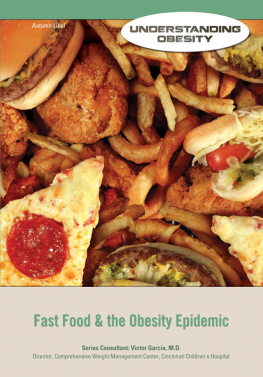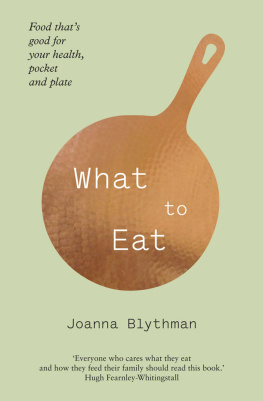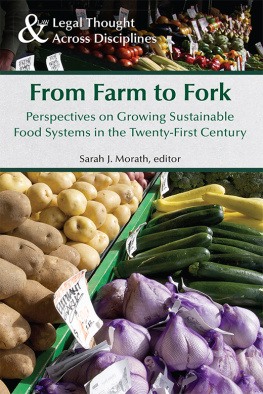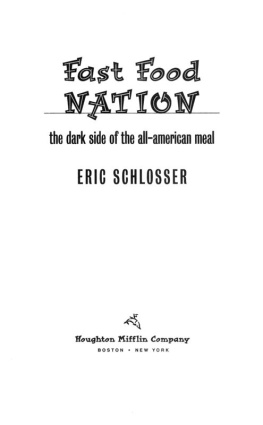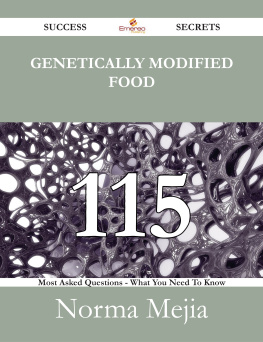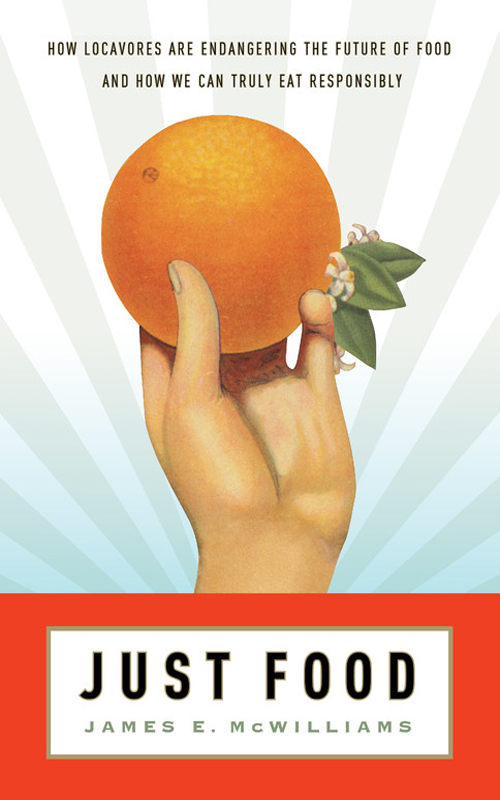Copyright 2009 by James E. McWilliams
All rights reserved. Except as permitted under the U.S. Copyright Act of 1976, no part of this publication may be reproduced, distributed, or transmitted in any form or by any means, or stored in a database or retrieval system, without the prior written permission of the publisher.
Little, Brown and Company
Hachette Book Group
237 Park Avenue, New York, NY 10017
Visit our website at www.HachetteBookGroup.com
www.twitter.com/littlebrown
First eBook Edition: August 2009
Little, Brown and Company is a division of Hachette Book Group, Inc. The Little, Brown name and logo are trademarks of Hachette Book Group, Inc.
ISBN: 978-0-316-05263-4
American Pests: The Losing War on Insects
from Colonial Times to DDT
Building the Bay Colony: Local Economy and
Culture in Early Massachusetts
A Revolution in Eating: How the Quest for
Food Shaped America
TO CECI
Introduction:
From the Golden Age to the Golden Mean
of Food Production
He who has food has many problems.BYZANTINE PROVERB
A pproximately 500 million years ago large clumps of sand and mud formed sedimentary rocks that trapped microscopic plants and animals. This geologic mash eventually decomposed into fossil fuels. For better or worse, these fuels would later serve the endlessly proliferating wants and needs of advanced human civilization. About fifty years ago scientists began to document the environmental problems caused by burning these fuels to power modern life, global warming being the most notable of them. At the turn of the twenty-first century, environmentalists tied this vast history into a tight knot by showing how conventional food production was responsible for a large portion of the greenhouse gas fouling todays atmosphere. Omnivores, the developed world learned, had a dilemma. We were killing the environment, and thus ourselves and our future, with a diet addicted to fossil fuels.
The most powerful response to this problem has been to produce and consume locally grown food, in other words, to become a locavore. What has happened since this locavore revolution started has been nothing short of spectacular. Millions of consumers in advanced societies the world over now demand that their food be locally sourced. The phrases food miles and local farmers market fall off the environmentalists tongue as inspired pearls of environmental wisdom. Organizations of environmentally concerned members eating 100-mile diets have bloomed across North America and Europe. Slow food is gaining on fast food as a conventional culinary ethic. In a matter of years, the idea of eating locally produced food has come to seem so indisputably sensible that its almost a moral obligation to book a seat on the bandwagon headed for the closest sustainable farm.
This revolutionbrimming with buzzwords such as sustainability, agroecology, foodshed, and carbon footprinthas resonated far and wide. Best-selling locavore writers have accomplished the seemingly impossible task of getting Americans to ponder where their food comes from, an achievement that must be celebrated. After all, we recently couldnt have cared less about the source of our food, but today Alice Waters is a household name. Michael Pollan is our unofficial farmer-in-chief. Wendell Berry is the agricultural romantics poet laureate. Many consumers now turn up their noses at tomatoes that are not heirloom, cows that do not eat native grass, and pigs that do not frolic across a verdant free range. The Golden Arches are the avatar of evil, and chicken nuggets are on par with crack cocaine as a substance to avoid. All in all, its very real progress. Locavores, and their ceaseless emphasis on fresh, local, sustainable food, are to be thanked for fueling an upsurge in ecological awareness about food and the more hopeful facets of its production.
But for all the deserved accolades, the locavore approach to reforming our broken food system has serious limitslimits that our exuberant acceptance of eating local has obscured. Although these limitations are many, the one Im particularly concerned with is this: Eating local is not, in and of itself, a viable answer to sustainable food production on a global level. In fact, its a relatively small step toward that critically important goal. As an environmental historian and the author of several books dealing with agriculture, Ive become increasingly convinced (somewhat against my will) of this point.
Current popular assessments of our food issues repeatedly and passionately insist that the problem of sustainable production can be solved though a primary emphasis on localism. The underlying premise is that agribusiness has undermined the environmental balance of small-scale food production and all we have to do is restore it by relocalizing the food systemthat is, taking it back to the way it once was. Most of my friends, as well as many of the writers, thinkers, and activists I most admire, strongly advocate this position.
My own research, however, has taught me something different. In the most general terms, its taught me that the omnivores dilemma is too complicated to be managed through a primary reliance on food grown in proximity to where we live. Such an emphasis, in fact, can in many cases be detrimental to the environment. By no means do I deny that localism has benefits, nor do I deny that agribusiness is generally irresponsible. But I am nonetheless insisting that there are more productive, creative, and global ways to think about the complicated problem of eating an ethical diet. There are alternatives to the local alternative.
My goal here is not to write a reactionary tract against the locavore movement. Instead, it is to step back, survey the broader landscape of food production and consumption, andwith all due respect to the locavore ethos (and I have a lot of it)grapple honestly with questions that locavores have yet sufficiently to confront: How can we, both collectively and as individual consumers, achieve a sustainable global diet? How can the world keep growing in population, feed itself, and at the same time preserve its natural resources for future generations? How can we produce an abundance of safe food while minimizing dangerous environmental costs?
Too often environmentalists brush aside such feed the world questions as traps intended to promote the productive strengths of factory farming. They point to that infamous agricultural experiment undertaken between 1945 and the 1980s called the Green Revolution and, with justification, highlight the environmental degradation and corporate consolidation that the revolution required to feed the masses a steady diet of rice and wheat. But who ever said that farmers growing food for the world should abandon the quest foras the agricultural ecologist Gordon Conway puts ita doubly Green Revolution? Who ever said that agribusiness, at least as it currently operates, has a monopoly on the quest to feed the world? For that matter, who ever said local was necessarily equivalent to sustainable, much less the only antidote to the excesses of the Green Revolution?
These kinds of questions have driven my research. Ive tackled them knowing full well that my answers will inevitably generate controversy. It hasnt taken me long to learn that challenging ideas about food is not unlike challenging ideas about religion. A systematic examination of whats required to produce food responsibly for billions of people necessarily demands that we confront issues which elicit emotional responses. Regrettably, our current culinary discourse has been pushed to extreme ends of the spectrum. Theres agribusiness on the one hand and theres the local farmer on the other. But somewhere in the middle theres a golden mean of producing food that allows the conscientious consumer to eat an ethical diet in a globalizing world. Ambitious as the goal may be, the golden mean is what Im seeking to pin down in the chapters ahead.


